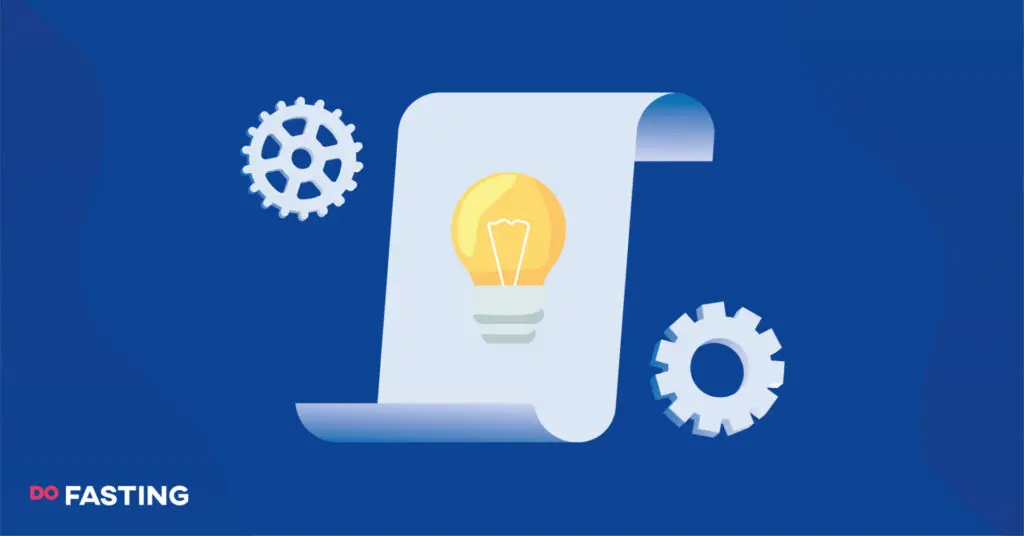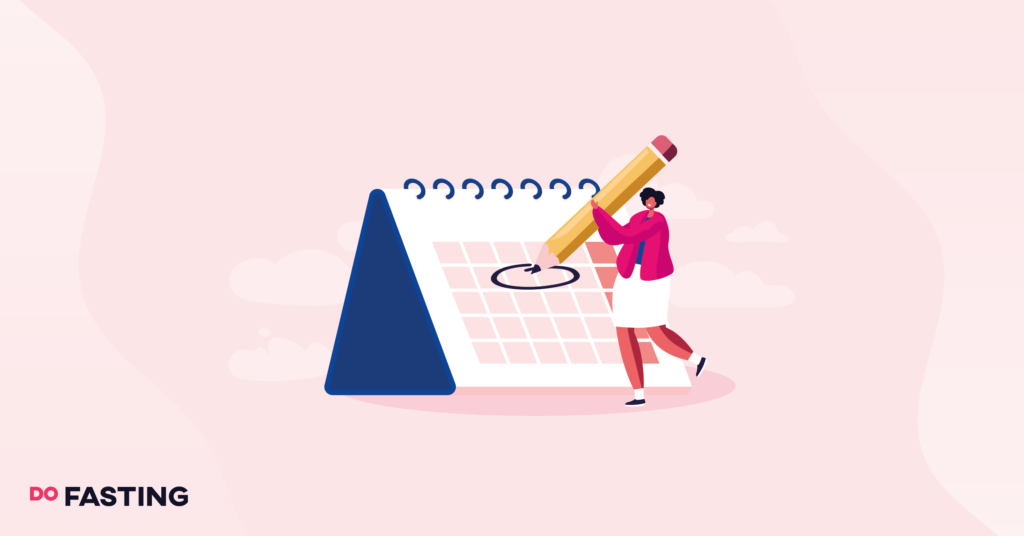Contents
What Is a Pescatarian Diet?
The pescatarian diet is a variation of vegetarianism where people consume mostly plant foods, dairy products, but also eat fish and other seafood. It falls within the vegetarian spectrum. Unlike many diet types, this one isn’t usually followed for weight loss.
Like all diets on the vegetarian spectrum, the approaches vary, and different pescatarians may approach it differently.
Take a
1-minute quiz
and discover how much weight you can lose with DoFasting!

What Do People on a Pescatarian Diet Eat?
Those following the diet can eat from a variety of food groups. These include:
- Fruits and vegetables, including starchy veg, dark leafy greens, brussels sprouts, berries, and other fruits.
- Legumes, beans, and pulses, including chickpeas, peas, lentils, and beans.
- Whole grains, like barley, rice, wheat, and oats.
- Nuts and seeds, including cashews, almonds, walnuts, hazelnuts, sunflower seeds, pumpkin seeds, and chia seeds.
- Dairy, including milk, yogurt, cheese, butter, and other dairy products.
- Plant protein, like tofu, seitan, and other meat substitutes.
- Fish and seafood, like fried fish, canned fish, fresh fish, shellfish, and other seafood.
- Protein, like eggs.
Eating the pescatarian way can vary from person to person. This means that while some followers may choose to eat dairy products and eggs, others may avoid all animal products and only consume fish.
The idea with this diet, and with many other vegetarian diets, is to eat lots of whole foods and other products with high nutrient content. Plant-based diets are considered an incredibly healthy choice if you follow them properly.
Some fish are better than others
When it comes to pescetarianism, there are some ways that you can ensure you’re eating healthy. How? Choose more nutritional food products.
Oily fish, like tuna, salmon, and sardines, is widely accepted as one of the best fish sources of nutrients. These kinds of fish come with a ton of omega-3 fatty acids which are great for boosting your health, particularly your heart health.
White fish, like tilapia and cod, tend to have fewer omega-3 fatty acids but come with many other nutrients and proteins that can help you stay healthy.
When you buy fresh fish products, it is always best to opt for wild-caught and organic fish. These products are less likely to be contaminated, have better nutrient contents, and are better for the environment.
Some fish may be best avoided, including shark, swordfish, and some kinds of tuna, which all are considered to have high levels of mercury.
What Pescatarians Don’t Eat
The pescatarian diet does vary from person to person, but there is one thing in common – all pescatarians choose to avoid any kind of meat products. This means that they do not eat either white or red meat, including beef, chicken, lamb, pork, and wild game.
Pescetarianism is an off-shoot of a vegetarian diet, so animal-based products are generally kept to a minimum. This means that some who follow this diet may also avoid gelatin and other products that have come from an animal.
Take a
1-minute quiz
and discover how much weight you can lose with DoFasting!

Benefits of a Pescatarian Diet
Vegetable-based diets come with their benefits. Speaking about a healthy pescatarian diet, it contributes to better overall health as well as a boost in the health of your heart. It could also be a good choice for those with diabetes and helps you to increase your nutrient intake.
We’ve had a look at some benefits below.
Full of omega-3 fatty acids
When you eat fish, particularly fatty fish, you consume lots of omega-3 fatty acids. These fatty acids have health benefits for the heart and the brain and can help reduce your risk of heart disease and other chronic health conditions.
Eating fish is the best way to consume omega-3 fatty acids, which is what makes the pescatarian diet so good for your health.
Packed with healthy nutrients
Seafood, in general, is packed with a ton of nutrients that come with many health benefits.
Fish, shellfish, and seafood in general are known for their vitamin B content as well as many other minerals, including potassium, magnesium, and phosphorus.
These nutrients are all vital for good health.
In addition to an increase in micronutrients, eating more fish also helps you to increase your protein intake. Eating more protein can help you reduce your weight and build muscle and is part of a balanced and healthy eating plate.
Healthy for the heart
Pescetarianism is a good diet for your heart and can reduce the risk of many heart problems.
Choosing not to eat meat is an excellent step toward a healthy heart, and those who eat more foods of plant origin tend to have healthier hearts.
Cutting out meat may help reduce markers of poor health, like high blood pressure and cholesterol levels, and it encourages you to eat more healthy fats that are better for your heart.
The pescatarian diet forefronts plant-based diets and encourages the consumption of fatty fish, rich in heart-healthy omega-3 and other nutrients.
Good for people with diabetes
Eating more vegetables, whole grains, and legumes can provide better blood sugar control and may be a good diet for those who have diabetes.
The added protein from the fish is thought to help slow down the metabolization of carbohydrates, help to control blood sugar levels, and improve insulin sensitivity.
Drawbacks To Watch Out For
As the pescatarian diet focuses primarily on highly nutritious, healthy foods, there aren’t many drawbacks to speak of. Many nutritionists recommend following some form of a plant-based eating plan, whether pescatarian, vegetarian, or the vegan diet.
If you are planning on trying out the pescatarian diet and are concerned, you should speak with your doctor to ensure you’re not going to miss out on vital nutrients. You could also talk with a nutritionist to develop a nutritious meal plan that follows a balanced pescatarian diet.
Though it is generally considered safe, this diet could be unsuitable for some. Some fish have high mercury content, which can harm young children and pregnant women.
Avoid fish with high mercury, like shark, king mackerel, and swordfish.
Additionally, as with many variations of the vegetarian diet, you may consume lots of carbohydrates. This could be an issue for people with high blood sugar levels, so tracking your carbohydrates may help.
Should You Start the Pescatarian Diet for Weight Loss?
This diet can be a good choice if you want to lose weight. There are many benefits to cutting meat out of your diet, especially red meat, as these products can contain high levels of saturated fat, and other unhealthy fats.
Though the diet is good for losing weight and encourages eating highly nutritious and healthy foods, it does not provide any guidance on what kind of meals you should eat and in what quantities.
If you focus solely on weight loss, you might not give due regard to how beneficial it is for your health. This means that you can switch to a pescatarian menu without actually following a healthy and balanced diet, and you don’t want that, right? Your health is the top priority.
The best method of losing weight is to eat at a calorie deficit. You can do this no matter the kind of food you are eating. Most people choose the pescatarian or vegetarian diet because of the health and environmental benefits rather than its benefits for weight reduction.
Combine the Pescatarian Diet With Intermittent Fasting for Faster Results
Intermittent fasting is a popular method used by those looking to lose some weight. It involves fasting for longer periods and is a form of time-restricted eating. It does not impose a calorie limit as many other diets do.
Intermittent fasting works for weight reduction because it imposes a calorie restriction by limiting the amount of time in which you can eat. If your eating window is only 12 hours each day, you cannot physically eat as much as you would if you ate up until bedtime.
It also forces the body to make the metabolic switch to ketosis. This is a metabolic state in which the body begins burning stored fat for fuel instead of blood sugar. This aids weight reduction and helps you to reduce body fat.
Intermittent fasting is also thought to increase your metabolism and have other health benefits like improving heart health and reducing your risk of heart disease, improving brain health, and increasing longevity.
There are several different intermittent fasting methods. To begin with, we recommend trying out a less-challenging form of IF, like the 12-hour fast, the 14:10 method, or the 16:8 method.
These methods lend themselves well to eating primarily vegetarian or pescatarian diets or the Mediterranean diet. These diets are all focused on healthy, whole, and nutritious foods that you should consume before long periods of fasting.
Starting intermittent fasting can be challenging, but it is made easier with apps like the DoFasting app.
This app lets you track your food intake, calories consumed, and water intake and show you your weight progress. It also reminds you when to fast and has a countdown until your next fast.
You will also find many intermittent fasting-friendly recipes on the app and workouts that you can do on any IF method.
Take a
1-minute quiz
and discover how much weight you can lose with DoFasting!

Conclusion
Pescatarian diets may vary from person to person, but generally, it allows you to eat a primarily plant-based diet along with fish, eggs, and dairy products. Those who follow the diet don’t eat any kind of meat or meat products.
The diet has benefits for the heart and overall health and may be used for weight reduction. Eating less meat is thought to help people reach a healthy weight and so cutting it out could help you to reduce your body weight.
It is an excellent diet to combine with intermittent fasting as it is filled with many whole and nutritious foods that help you remain in good health while fasting. In addition, you would combine the benefits of intermittent fasting with the benefits of this kind of diet.
It is considered generally safe for most people, but children and pregnant women should avoid fish with high mercury contents.
See how DoFasting will improve your life
Find out what works for you with this 60-sec quiz approved by our experts and get your personal revolutionary fasting assistant.
Start the Quiz













